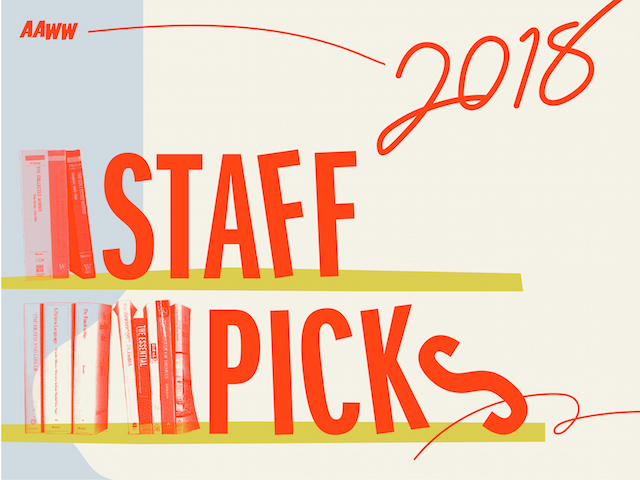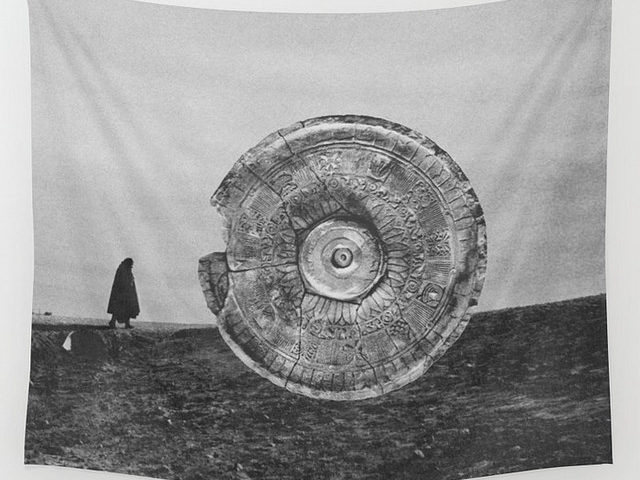Moroccan surrealist poetry, Dickensian Korean American fiction, Chinese mythology made new, memoirs of a post-Marcos Philippines, and more.

August 2, 2018
Whether you’re commuting to work, on a train towards a wild and winding adventure, or relaxing at home for the nth hour, here’s a reading list of recommendations from AAWW staff, interns, and fellows. Rise to the moon with new poems by Jennifer S. Cheng, dive deep into the throes of love, ancestry, and memory with Hieu Minh Nguyen’s latest poetry collection, reach the zenith of self-reflection with Alexander Chee’s collection of essays, and so on down the list of writing we are keeping cool with this season at AAWW.
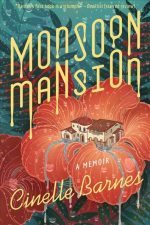
Monsoon Mansion by Cinelle Barnes
Monsoon Mansion, Cinelle Barnes’ debut memoir about growing up in a fractious and divided household in post-Marcos Philippines, opens with an epigraph from Frances Hodgson Burnett’s The Secret Garden about the intuitions of the body, those moments when our physical actions carry us forward even when our hearts and minds remain unsure. The arc of Barnes’s story, which follows the splintering of her nuclear family through the decline of her majestic childhood home, is set against a backdrop of socioeconomic turmoil and has been likened to the work of Burnett and the trappings of a modern fairy tale, but it’s the weight of the memoir’s characters and the complex, ever-shifting relationships between them that carries the real thrust of the narrative. Barnes works hard to parse out the motives, background and personalities of her closest relatives, often in the face of extreme pain. This is especially true in the case of Barnes’s mother and the combination of ambition, intelligence, past trauma and stifled potential that motivates her to put her and her children in harm’s way. Through the course of Barnes’s work, we come to find that the body does have mechanisms for survival and that sometimes the twinning of resolve and perseverance can lead to small moments of grace. (Little A)
—Jen Lue, Margins Fellow
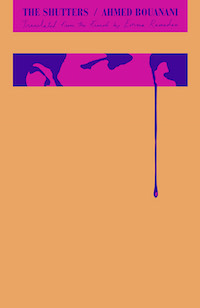
The Shutters by Ahmed Bouanani, translated by Emma Ramadan
Dreams take many shapes in Ahmed Bouanani’s The Shutters, the newly translated collection of prose and poetry by the famed Moroccan filmmaker. Warped dreams, dream houses, dreams of the nation-state, exploded dreams whose remains are buried with the trash—they litter the world of The Shutters. Translated by Emma Ramadan, Bouanani writes of post-colonial and post-War Morocco in surreal, tense prose. His writing has a mythic sweep to it, but he also knows the power of the blunt image, that which cuts through the murk of politics, the state, and the self. Through all the talk of dreams, the line that has stuck with me most during this ugly, violent summer is heavy with the weight of the real: “There is too much blood on the sidewalks.” (New Directions)
—Yasmin Adele Majeed, Assistant Editor
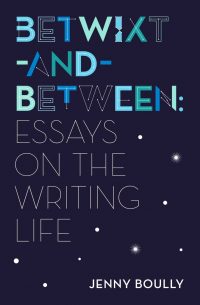
Betwixt & Between: Essays on the Writing Life by Jenny Boully
“In the literary world, I find that I spend a lot of time trying to keep everyone from being disappointed in me,” writes Jenny Boully in an essay in her collection Betwixt-and-Between. “I may look like an essay, but I don’t act like one. I may look like prose, but I don’t speak like it. Or, conversely, I may move like a poem, but I don’t look look like one.” It’s precisely the way in which genre bends through her writing that makes Boully’s essays so stimulating. She moves along the edges of ideas, of the self in a way that captures what the practice of writing can feel like inside. Written across Boully’s career as a writer, the essays in Betwixt-and-Between are at at once playful, philosophical, laced with theory, rooted in memoir, and generous in their insight. She writes about daydreams, heartbreak, witchcraft, hybridity, and propelling ourselves into the future. The book’s title is a reference to JM Barrie’s description of Peter Pan as betwixt-and-between—Boully writes, “he is not quite a boy-child nor quite a bird, not wholly living in make-believe nor wholly living in the consequential world.” Neither this nor that. It’s a way I might describe pieces of my own writing, that fall out of categories, that feel out of place. But somehow after reading Boully’s essays I felt compelled to return to the fragments I’ve left dangling in journals, to the lists and jottings, and, as she describes in an essay late in the book, “to experiment, to practice, to pretend, to fracture, and then to make anew.” (Coffee House Press)
—Jyothi Natarajan, Editorial Director

Octavia’s Brood: Science Fiction Stories from Social Justice Movements edited by adrienne maree brown and Walidah Imarisha
“Whenever we envision a world without war, without prisons, without capitalism, we are producing speculative fiction.” Octavia’s Brood introduced me to visionary fiction as a genre. Each author enraptured me in their stories and worlds. Their words taught me what it means to be a writer during the times we live in, how we connect to blood and chosen ancestors past and future, how imagination is rooted in our DNA, and how we create worlds in our being. It was everything I needed in this moment, in my personal and political life. (AK Press)
—Huiying B. Chan, Open City Fellow
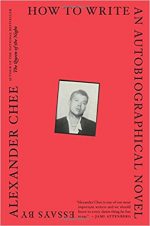
How To Write An Autobiographical Novel by Alexander Chee
From the hustle and bustle of the Castro in the 90s to a master class with Annie Dillard, Alexander Chee’s new book of essays is equal parts on writing about life as it is about a life lived, consciously or not, through writing. A composite of essays both previously published and newly written, Chee urges all his readers to look to writing and to life in more ways than one. I had the pleasure of attending one of Chee’s readings at Book Culture, only to follow him to BAM to hear him speak again. Humble, sharp, and most eloquent in speech, demeanor, and words, Chee packs his book in a red slip, bound by the image of his youth. In these essays, not unlike his previous novels Edinburgh and The Queen of the Night, Chee unearths histories—political, global, and personal—and invites readers to re-evaluate them with him. His advice is practical yet always dusted with just a bit of magic, of romance: “The novel is already at the door. Waiting, but just for a little. It is the lover again, impatient again. Wanting again for you to know everything.” (Mariner Books)
—Gwen Z., Editorial Intern
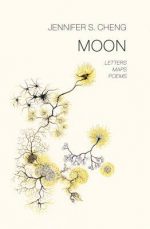
Moon: Letters, Maps, Poems by Jennifer S. Cheng
Reading Moon: Letters, Maps, Poems, I feel as if I am underwater—everything is luminous and blurred and slippery. Jennifer S. Cheng borrows the stories of various mythological Chinese women, like the Lady in the Moon and the Snake Sisters, to unravel the boundaries of womanhood, home, the body, and poetic form. Like light passing through water, Cheng’s personal experiences, particularly her sojourn to Hong Kong, shine obliquely through the myths she retells, allowing us glimpses into the heart of a woman who chooses to leave behind her home and her marriage, even if temporarily, to fly. A woman setting sail, a woman rising to the moon, or in her words, “here is a woman watching her house come undone.” (Tarpaulin Sky)
—Pik-Shuen Fung, Margins Fellow
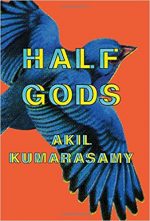
Half Gods by Akil Kumarasamy
Half Gods published by FSG this summer is a brilliant collection of inter-linked short stories from Sri Lanka to New Jersey. Told through the winding journeys of one family, it’s a startlingly beautiful debut, bringing together the exiled, disappeared, and the seekers. These stories redraw the map of our world in surprising way—it’s thoughtful, intentional, and at point painful. (FSG)
—Zena Agha, Margins Fellow
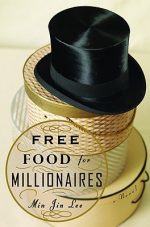
Free Food for Millionaires by Min Jin Lee
Min Jin Lee’s Free Food for Millionaires is a look into Korean American lives in New York City. Lee’s omniscient narrator expertly explores the diverse cast of characters, all uniquely flawed. This book was a compelling page turner that reminded me of the dramas I watched as a child with my relatives (and now alone in my bedroom via Netflix). The events that take place are reminiscent of an alluring, fantastical K-drama: affairs, fires, and an unexpected pregnancy. However, the emotions of the story—the precarious nature of immigrant life, financial fear as stark as a Dickens novel, the self-consciousness experienced in a white world, and the faltering intergenerational bonds of family—felt remarkably authentic. Also read Pachinko! (Grand Central)
—Jean Lee, Development Associate
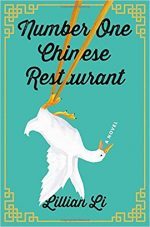
Number One Chinese Restaurant by Lillian Li
Li’s debut novel offers a tough, uncensored, funny, and often tender and deeply human look at the Beijing Duck Houses’ lifeblood–a network of waitstaff, duck carvers, and chefs, whose relationships to each other stretch well beyond the kitchen. Bustling and quick-paced, Number One Chinese Restaurant delivers a hilarious and heart-wrenching portrait of what it means to strive, both in one’s ambition and one’s personal longings, in a community stitched together by a history of debts, struggles, and, ultimately, loyalty. With intelligence and affection, Li brings to the table a host of interconnected characters, each which bubbles with rich emotional life. Number One Chinese Restaurant was a delight to read. (Henry Holt)
—Willa Cuthrell-Tuttleman, Author Events Intern
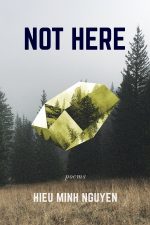
Not Here by Hieu Minh Nguyen
Hieu Minh Nguyen’s Not Here embraces the sentiments of difference in both context and form. The book is a series of investigations and negotiations between the known and the new, both in the personal and the political. Nguyen does not shy away from exploring a strongly thematic narrative. The book is very much an interrogation of the speaker’s possible new identity as Nguyen explores this both in context and form. The lines end up creating dialogue with space and agility, and hence, resonating with the theme of memory. Other thematic aspects that bring life to Nguyen’s verses include family and ancestry, and love and sexuality. (Coffee House Press)
—Ayesha Raees, Margins Fellow

Eye Level by Jenny Xie
The first poem in Jenny Xie’s Eye Level is titled “Rootless” and ends, “At present, on this sleeper train, there’s nowhere to arrive. / Me? I’m just here in my traveler’s clothes, trying on each passing town for size.” For me, Eye Level read as a vessel through the parallel universes of memory punctuated by evocative imagery and exquisite poem-making. To be honest, I spent quite a long time reading this collection, partly because I loved luxuriating in lines that described rain as “combed through” and “water growing out of water,” but also because I was often pausing to catch my breath and mutter, “This is a perfect poem.” In this reader’s opinion, Eye Level is a collection of perfect poems! Ever read the same three lines over and over for hours at a time? I spent days tethered to the first section of “Visual Orders”: “Harvest the eyes from the ocular cavities./ Complete in themselves:/a pair of globes with their own meridians.” (Graywolf)
—Tiffany Tran Le, Programs Assistant

